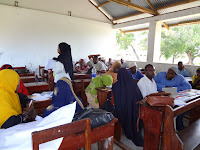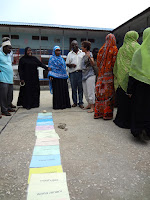Small Steps
Note: Peter is planning a separate blog that will appeal to current
and recently retired school and school system administrators who might also be
considering this kind of experience.
Another Note: Photos will open up if you click on them.
The METHODOLOGY
COURSE, funded by the British Council, is now finished, with much pride,
celebration and relief to all 170 teachers of all subjects from the six
secondary schools involved.
 |
| a school's lead teacher teaching staff |
 |
| Group work |
The course was meant for teachers who could speak and read at
a high level of English and were able to understand and teach quite
sophisticated grammatical concepts. It was very challenging for many. (Although
all secondary level subjects are supposed to be taught in English, the teachers
are not able to do so.)
 |
| Celebratory lunch |
The teachers, the large majority of whom are women, spent a
good deal of their time outside of their regular day learning how to encourage
their students to participate in their learning through a variety of activities
and to take risks by attempting to answer questions without fear of the
teacher’s anger, punishment or harsh or demeaning response.
Many teachers in Zanzibar have second jobs because they are
so poorly paid. In addition, women do
all domestic and child-related tasks: their willingness to
participate in this course was admirable, to say the least.
 |
| a group of dedicated educators |
Our final ‘event’ was a GENDER EQUALITY WORKSHOP---a sensitive topic---to raise awareness of the 75 lead teachers and department, school , and assistant heads. The main speaker was Eliud, a Kenyan male volunteer whose job is to take this same message to Zanzibari villages. My role was part organizer and part ‘Vanna’.
 |
Adjectives arranged by gender
|
Eliud presented the activities in Kiswahili to ensure that everyone understood the message and participated with ease in the discussions.
Clearly, this topic had not been addressed before: many took the opportunity to voice their thoughts. The message that change begins at home through setting examples with their own children was well-received by the women and, after some initial discomfort, a good number of the men.
 |
Gender roles: social or physical
|
Each school was given a package of workshop materials to use
with its staff, and for the teachers to use with their students. I believe there’s
a good chance of this happening.
Follow-ups are in order.
Facts
According to the Tanzanian Demographic and Health Survey, (2004/5), there are 5 reasons why men beat their women:
1. Burning the food
2. Neglecting the children
3. Arguing with their husband
4. Refusing sex
5. Going out without permission
The DHS (2010) reports that:
48.9% of women aged 15-49 who were questioned said that their husbands made the final decision as to whether they could travel to visit family.
There is no law in Tanzania specifically addressing domestic violence. Domestic violence remains very widespread and severely under-reported due to stigma and pressure from family and the community to remain silent. Police are generally unwilling to interfere.
The minimum legal age for marriage is 15 for women and 18 for men, but the law allows exceptions for girls aged 14 years under 'justifiable' circumstances. (The law has been under review since 2008.)
The United Nations in Tanzania report (2011) reports that:
Tanzania ranks 125th out of 155 countries on the gender-related Development Index of 2009.
High drop-out rates for girls and gender parity in secondary and tertiary education remain a concern.
Maternal mortality remains high.
The burden of HIV is still heavy, with higher infection rates in women than in men.
Women continue to be more likely than men to be poor and illiterate, to be subject to gender-based violence and usually have less access than men to medical care, property ownership, credit, training, and employment.

.JPG)
.JPG)
.JPG)
.JPG)
.JPG)
.JPG)
.JPG)
.JPG)
.JPG)
.JPG)
.JPG)

.JPG)
.JPG)


.JPG)
.JPG)
.JPG)
.JPG)
.JPG)







